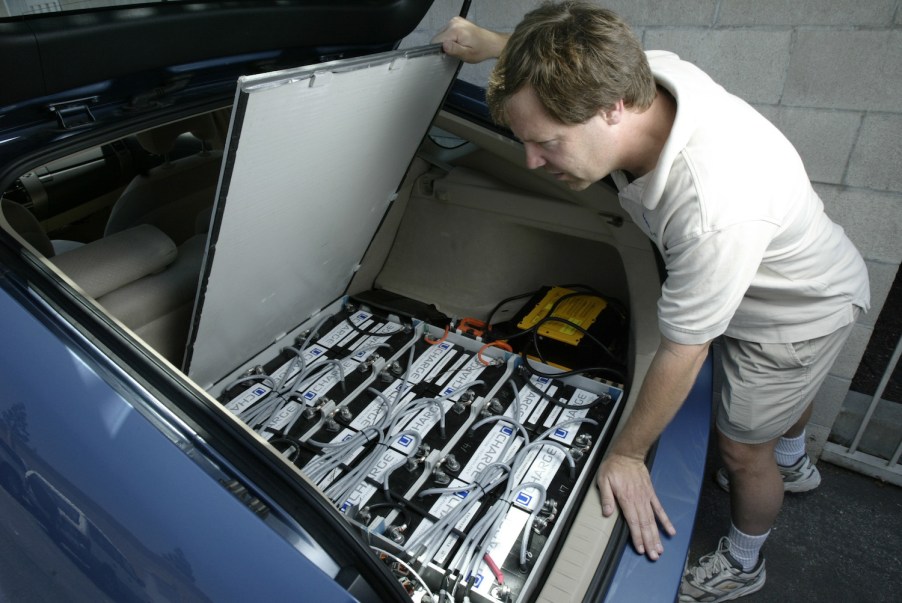
Can You Upgrade a Toyota Prius’ Hybrid Battery?
Is it time to replace your Toyota Prius‘ high-voltage battery? If you’re dreaming of an upgrade, you’re in luck. Toyota assembled many Priuses with a nickel metal hydride (NiMH) battery pack, but aftermarket suppliers have engineered a lithium-ion replacement. This upgrade offers 2.6 times as much power and weighs half as much, leading to an even higher MPG. Note that Toyota still builds new, AWD Priuses with NiMH batteries because it finds they last longer in extremely hot or cold climates.
Which Toyota Priuses have nickel metal hydride batteries?
When Toyota first began selling the Prius hybrid in the United States in 2000, every vehicle had a nickel metal hydride (NiMH) high-voltage battery, also called the traction battery. In 2015, the automaker began offering lithium-ion (Li-ion) batteries in certain trims of its hybrid. But Toyota still uses NiMH batteries in some Priuses, namely AWD models.

If you have an AWD Toyota Prius (branded as the AWD-e), it probably came with a nickel metal hydride (NiMH) battery stock. If you have a Prius that Toyota built before the 2015 model year, it also probably came with a NiMH battery stock.
If you have an upper-trim FWD Prius from 2015 or later, it may have come with a lithium-ion battery from the factory. In this case, installing a replacement Li-ion battery will refresh it to its stock performance, but won’t be a major upgrade.
Interestingly, Toyota has been selling a seven-seat version of the Prius V crossover in Japan and Europe since 2012. To make the third row of seating possible, Toyota replaced the regular NiMH battery a smaller lithium-ion battery set into the center console. In addition, every plug-in hybrid Toyota Prius (the Prius Prime) leverages a large lithium-ion battery.
How much does a lithium-ion battery improve an old Toyota Prius?
The aftermarket Toyota Prius lithium-ion battery dealer–Project Lithium–claims that upgrading your NiMH battery will improve your Prius’ performance. This is because the Li-Ion battery stores 2.6 times more energy, in half of the weight.

Toyota Prius drivers have experienced a range of results when replacing their old NiMH battery with a Li-Ion pack. Larry Chen of Temple City, California, said, “First time hitting 3 miles on pure EV mode, incredible, car drives like new and accelerate [sic] faster than new.”
Deane Olympia of Seattle, Washington added that they tested their new battery, “over Siskiyou pass…It’s a totally different car at the highest elevation of I-5 when it’s down at 2-3 bars. Still lots of power!”
Project Lithium sells Li-ion Prius batteries for roughly $2,400, which will fit in the following models:
- 2004-09 Prius Gen2
- 2010-15 Prius Gen3
- Lexus CT200h
- 2010-12 Auris hybrid
- Prius V NiMH variant
Find out the true cost of replacing a hybrid battery.
Are nickel metal hydride (NiMH) batteries better for some hybrids?
One benefit of NiMH for automakers is that its price is more consistent, even when the lithium market fluctuates. In addition, it may last longer even when charging and running at extreme temperatures.

There is a reason Toyota still uses NiMH batteries in its AWD-e Priuses. According to Green Car Reports, one reason Toyota uses both NiMH and Li-ion batteries in its current Prius lineup is that it can make most vehicles with either material and react rapidly to shifts in the supply chain.
The publication adds that Toyota chooses NiMH batteries for its AWD Prius for a reason: NiMH batteries last longer in extremely cold climates. Toyota is assuming its AWD cars will be more popular in northern climates. If you live in an especially cold place, you might think twice before swapping your Prius’ NiMH battery for a Li-ion unit.
Read about how the looming lithium shortage might change replacement battery prices or learn more about how NiMH and Li-ion affect your Prius’ performance in the video below:
These are for Gen2 and Gen3 cars only. Specific models include:



